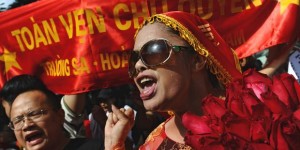Vu Quoc Ngu, Aug 27, 2014
Bui Thi Minh Hang, an anti-China activist and human rights advocate, has been sentenced by Vietnam’s communist government to three years in jail for fabricated traffic offense, foreign media reported.

Bui Thi Minh Hang is a well-known activist who has taken part in anti-China protests.© AFP/Getty Images
On Aug 26, the People’s Court in the Mekong Delta province of Dong Thap found Mrs. Hang, rights activist Nguyen Thi Thuy Quynh, and independent Hoa Hao Buddhist practitioner Nguyen Van Minh guilty of “causing public disorder.” Ms. Quynh and Mr. Minh were given 24-month and 30-month imprisonments, respectively.
The trial was held with thousands of policemen and militia tightening security, according to observers. About 70 activists from many provinces and cities to support the trio were arrested and some were beaten by policemen outside of the courtroom.
Mrs. Hang, Ms. Quynh and Mr. Minh were among 21 bloggers and social activists on Feb 21 when they rode motorbikes from Ho Chi Minh City to visit Nguyen Bac Truyen, a former political prisoner in Dong Thap province. The others were released on the next days while the trio was charged of conducting activities to cause public disorder under Article 245 of the Criminal Code.
The Vietnamese government has criminalized the political case since Mrs. Hang is famous for her activities protesting China’s violations of the country’s sovereignty, land corruption and the government’s harassment against unsanctioned Hoa Hao Buddhist sect, said local observers.
Mrs. Hang was a key figure in anti-China protests in Hanoi and Ho Chi Minh City in the 2011-2013 period, during which Beijing conducted a number of assertive moves to violate Vietnam’s sovereignty in the East Sea, including sending ships to cut seismic cables of PetroVietnam offshore. She was detained many times by police, and two times was imprisoned for several months by Hanoi’s authorities for her patriotism as well as protests for authorities’ illegal seizure of land of other citizens.
Prior to the trial, the Human Rights Watch and the International Federation for Human Rights (FIDH) called on the Vietnamese government to release Hang and her two colleagues while the U.S. announced it will closely watch the case.
Immediately after the trial ended, the U.S. Embassy in Vietnam issued a statement expressing deep concerns about Vietnam’s conviction and sentencing the trio. This conviction appears to be inconsistent with the right to freedom of expression and Vietnam’s obligations under the International Covenant on Civil and Political Rights and commitments reflected in the Universal Declaration of Human Rights, the embassy said, adding the use of public disorder laws by Vietnamese authorities to imprison government critics for peacefully expressing their political views is alarming.
The U.S. calls on Hanoi to release unconditionally the trio, as well as all other prisoners of conscience, and allow all Vietnamese to express their political views.
The trial of Mrs. Hang, Ms Quynh and Mr. Minh was carried out when the ruling Communist Party of Vietnam sends Le Hong Anh, a member of the party’s Politburo member to Beijing to seek to cement bilateral ties which dropped to the lowest level during the past few years after China illegally parked HYSY-981 oilrig with escorting naval ships and armed surveillance boats within Vietnam’s waters in early May and removed it on July 16. The Vietnamese communists still consider China the closest political ally although Beijing regularly violates Hanoi’s territorial sovereignty.
The sentences were unexpectedly heavy as in recent months, Hanoi released a number of political prisoners, including prominent legal expert Cu Huy Ha Vu in a bid to gain support from the U.S. and other countries during negotiations of Trans-Pacific Partnership agreement.
The heavy sentences for the trio signaled that Hanoi has chosen to switch away from the U.S. and other countries which called on the communist government to improve its human rights record, and taken steps closer to China, said Hanoi-based political analysts.
Vietnam has used controversial laws to silence political dissent. According to international human rights bodies, Hanoi holds around 200 political dissidents and outspoken bloggers while it always denies, saying it imprisoned only law violators.
Height Insoles: Hi, I do believe this is an excellent site. I stumbledupon …
http://fishinglovers.net: Appreciate you sharing, great post.Thanks Again. Keep writi…
Achilles Pain causes: Every weekend i used to pay a quick visit this site, as i w…






August 28, 2014
Vietnam Sentences Anti-China Activist to 3 Years in Jail for Bogus Traffic Offense
by Nhan Quyen • Bui Thi Minh Hang, Nguyen Thi Thuy Quynh, Nguyen Van Minh
Bui Thi Minh Hang is a well-known activist who has taken part in anti-China protests.© AFP/Getty Images
On Aug 26, the People’s Court in the Mekong Delta province of Dong Thap found Mrs. Hang, rights activist Nguyen Thi Thuy Quynh, and independent Hoa Hao Buddhist practitioner Nguyen Van Minh guilty of “causing public disorder.” Ms. Quynh and Mr. Minh were given 24-month and 30-month imprisonments, respectively.